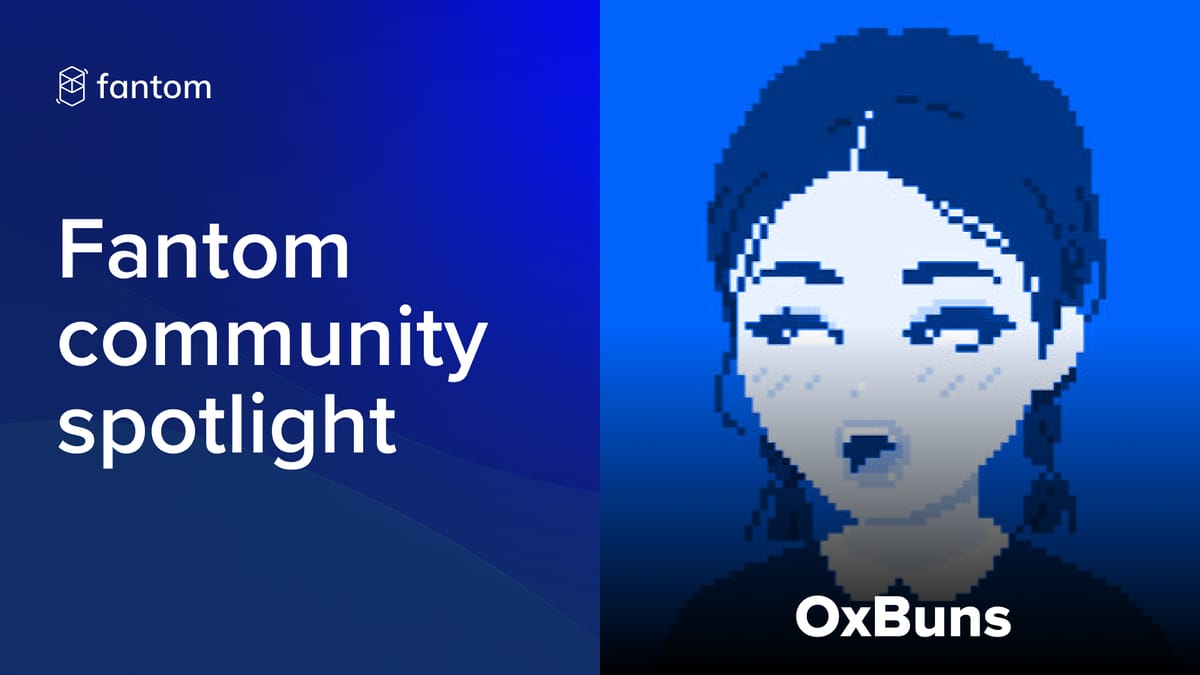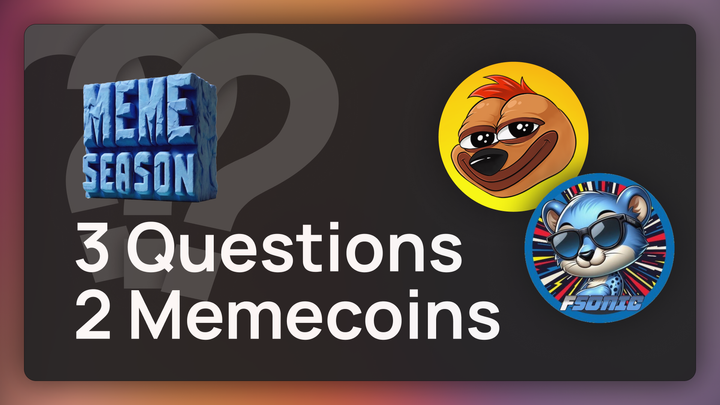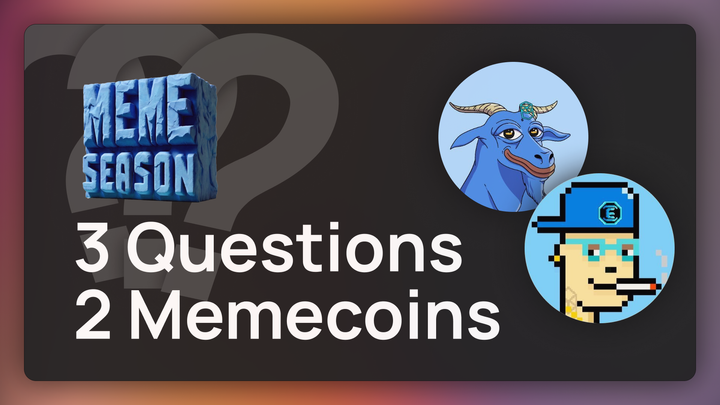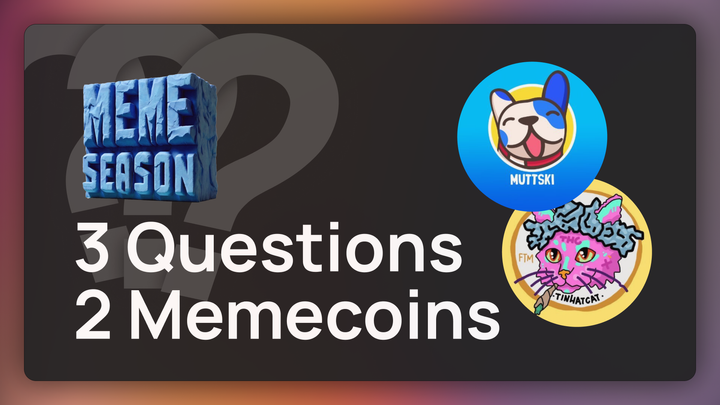Fantom Community Spotlight - 0xBuns

In the pursuit of financial freedom, 0xBuns took the COVID lockdown as an opportunity to teach herself a new set of skills. Now, as co-founder of Soulswap Finance and Luxor Money, she seeks to empower the community members she serves in their own pursuit of financial freedom.
The road that led to Soulswap was full of trials and tribulations, but not even a period of homelessness deterred Buns from forging forward.
How did you first get into crypto?
I recall hearing about Bitcoin in 2011, and I found it an interesting concept, but not as an investment. It sounded like just another means to an end.
It wasn’t until the COVID pandemic, many years later, that I found myself drawn back to the concept.
At that point, there were two primary catalysts that launched me into the world of blockchain: the intellectual exploration, and the support system I found in a strong online community.
As a big economics and computer science nerd, the intellectual aspect drew me in simply because crypto was the wild west of cutting edge technology, an exploratory zone for me to hypothesize different concepts that didn’t materialize in the “real world.”
At the same time, with the onset of Covid, I had gone from having a supportive community around me to living in isolation. Out of sheer restlessness, I started looking for something to keep myself occupied.
My 9-5 day job was as a forecaster for the largest HVAC manufacturer in the world, where I also served as president of QUANTS. I led lectures and practicums in Data Science topics, namely those concerning machine learning in Python and data exploration in R.
When did you get involved in the Fantom Ecosystem?
I started off moderating for a couple crypto projects’ Discord servers and Telegram groups. My approach was: I’ll moderate, and if you think I do a good job then you can pay me, but until then you don’t need to.
They all paid me because they found my contributions valuable. I did everything from creating graphics to writing explanations so people could better understand the protocols they were investing in. Getting involved in this manner helped me stave off the loneliness I’d been feeling during the COVID epidemic, following a breakup and unfamiliar isolation during my now-remote occupation.
Eventually, I realized there was real money and opportunity in this space, but I still had a time-intensive career at the time, which relied on me to craft and implement logistical solutions to new-found constraints imposed by the global conditions at the time. I was tasked with managing logistics during the onset of the COVID outbreak and was confronted with the arduous task of forecasting productivity in what felt like a whole new world.
Instead of quitting that job outright, I decided to do both. Truth be told, I had no life outside of it, so why not?
To get the ball rolling, I enrolled in a course by Gregory from Blockchain University. (They interviewed me on my experience if you want to check it out here.)
How did you eventually decide to build your own protocol?
My skills were put to the test when the lead developer on the first project I had just joined abandoned the project, so I had to learn to fend for myself and adapt to everything quickly; otherwise, I would have let down a community that just experienced a rug pull from another project and was seeking refuge in ours.
The first thing I had to learn how to do was write a merkle airdrop contract. Now it’s second nature, but back then it was a grueling week of trying to understand how to do it. It was a matter of making things right for this community, and I knew I had to make it happen.
In learning how to write and deploy the contract, I wrote an article entitled: “An Unruggable Airdrop.” If not implemented properly, an airdrop can do a lot of damage to the actual token value. I ended up implementing an element of gamification to incentivize people to wait to claim their rewards.
After these experiences, I realized the value I could add by leveraging my practical wisdom and classroom education concerning the topic of behavioral economics, especially as it relates to taking advantage of one’s heuristics—the decision rules one employs when provided with multiple options to select from.
After all, theories are only as strong as their underlying assumptions, which makes pertinent the value in discerning between how one ought to behave according to classical economics, versus how they actually behave, in practice.
After that project, I worked as the lead Solidity developer for a couple other projects, but they weren’t under my leadership. I was subject to these weird constraints and conditions, and sometimes badly formulated beliefs.
The inception of Soulswap came around during a time when my cofounder and I were each dealing with a difficult time in our lives, and we ended up bonding over our shared experience at the same time.
We thought of SoulSwap as a place on the blockchain where souls live forever, and we wanted the concept to pay homage.
What made you decide to build on Fantom?
From a technological perspective, my blockchain of choice was Fantom because of its DAG technology. I knew Fantom’s consensus mechanism would allow it to avoid a lot of the scalability issues found on other blockchains; in other words, I saw it as future-proof.
The low cost of transactions was also an important factor. The level of exposure Ethereum provides is amazing, but I felt it was almost unethical for me to price out so many of the people that might want to use our protocol.
The other major appeal was Fantom’s community. There’s something about it that encourages you to be yourself, to be a bit strange and feel welcomed despite it—or even because of it.
What do you envision as the future of DeFi?
DeFi enables anybody with an internet connection to access financial opportunities that they would’ve never been able to access prior to the advent of decentralized finance.
I often hear stories from people who live all over the world, for whom one airdrop from my project equates to a month’s salary.
That’s part of why I love doing giveaways, which are based on engagement “challenges” like listening to town hall, which we host every Saturday, and answering questions based on the information we shared.
DeFi is also a paradigm-shift for builders. Prior to crypto, I had a fruitful career, however I would’ve likely never had the ability to build a company with a multi-million dollar valuation without securing substantial outside upfront investments. And this has enabled me to provide for my family in ways I only dreamed of.
And if that’s here in America, you can only imagine the life-changing opportunity this presents for builders and developers in other countries.
Opportunity isn’t always just thrown at you, and whenever it is you have to seize it.
I’ve been homeless before. I lived for at least six months without having a home address. It certainly wasn’t fun experiencing that level of financial insecurity: being hungry, not having a place to go home to, always feeling like an intruder in someone else’s space.
At the time, I was completing my graduate degree and I had run out of grant funding. I didn’t even realize because the financial services department at my University failed to inform me until I was wrapping up the year. Suddenly, I had to find a way to pay for all of that.
Within SoulSwap, how does the average user participate in governance?
We use what we call an AURA to capture one’s governance power. AURA captures the total presence one has in our protocol. You receive more AURA based on your various liquidity positions in addition to holding our native token SOUL and our staking receipt token SEANCE.
In the future, as we move towards full-decentralization, we will begin implementing delegation, which enables users to pass on voting power to a selected representative. This way, people who are active decision makers can participate in that capacity, and those who delegate to them don’t have to worry much about learning the nuances of the protocol.
I view governance delegation as the future trajectory of DeFi, especially as DAOs become more prevalent. You’ll start to see the creation of voting blocks, as there is a lot of money at stake, held in these decentralized treasuries.
How can investors differentiate good projects from great projects?
If you are putting your time, money, and energy into a protocol, then make sure that protocol is responsive to you and the community.
Without a clear chain of communication, communities weaken as investors feel ignored and begin to dwindle out. When that happens, protocols start to crumble.
Personally, I make it a point to be in constant contact with the community; even if people urge me to stop listening to every single opinion, I believe I can work more productively if I’m able to take in multiple perspectives and iterate based on the feedback I receive.
There’s no reason professional development work and community management need to be mutually exclusive. In fact, we track user requests via our publicly-accessible boards, found here.
On that note, I believe in the philosophy of investing in the leader of the community, and that means having a solid understanding of what their motivations are. A project is only as successful as its leadership.
When you invest in a team, ask yourself: who’s making the decisions, and are they really an authority on the topic at hand? Oftentimes, you might have builders who have expertise within one particular domain, but don’t have the wider background and technical expertise to bring their vision to fruition.
Pay close attention and trust your gut when it comes down to your evaluation of a project and its future performance. Ultimately, no one is right 100% of the time, so remain open and honest with yourself and your expectations.



